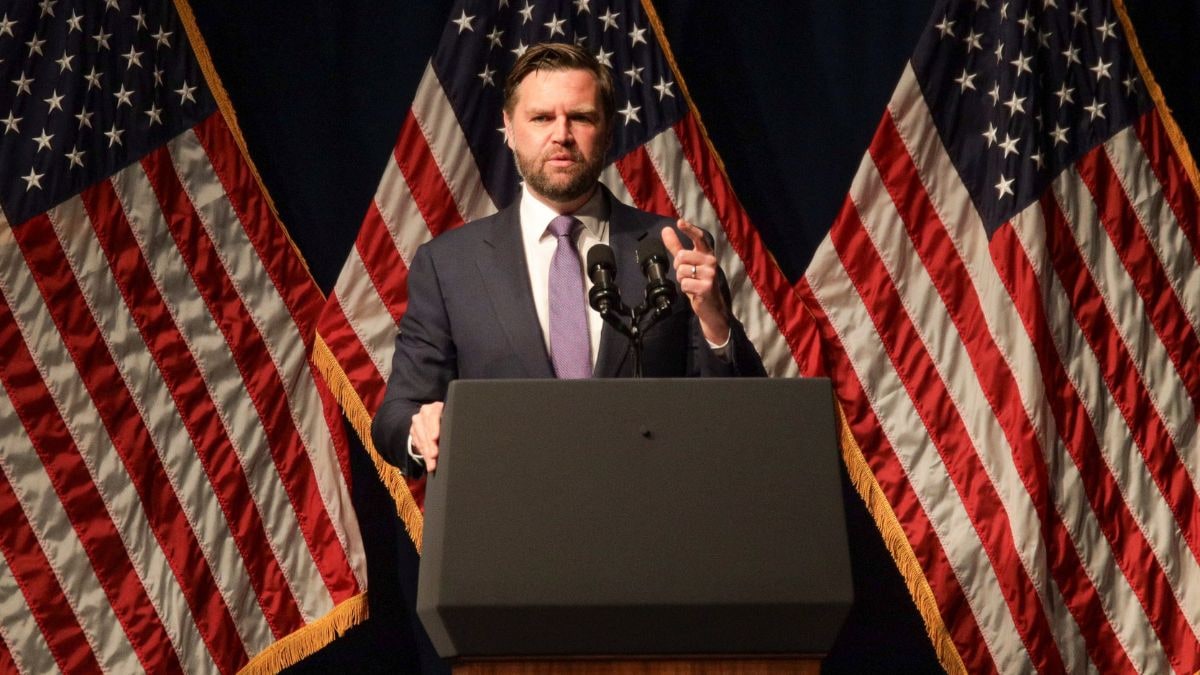Is the United States denying entry to foreigners due to political memes? The bizarre question arose after a Norwegian traveller claimed he was stopped from entering America as immigration agents took objection to a doctored photo of a bald US Vice President JD Vance on his phone.
The claims were soon picked up by the media and blew up. As the story grabbed eyeballs around the world, the US Customs and Border Protection (CBP) issued a clarification.
Let’s take a closer look.
Was tourist not allowed into US over Vance meme?
A Norwegian tourist claimed he was denied entry into the US after authorities found a meme of JD Vance on his phone at New Jersey’s Newark Liberty International Airport on June 11.
His accusation was first reported by Norwegian news outlet Nordlys. Mads Mikkelsen, 21, told the local newspaper upon his return that the US officials had threatened to fine him $5,000 (Rs 4.27 lakh) or imprison him for five years if he refused to provide them with his phone password.
The Norwegian tourist complied with their demand and unlocked his phone, allowing agents to go through the phone.
He said that was when they spotted the Vance meme. Mikkelsen told BBC, “The agent seemed to be very antagonised by the image. He asked me why I had it saved on my phone.”
The young man said he explained to them that it was only a meme, but the agent, he said, replied: “It’s very clearly a piece of dangerous extremist propaganda”.
Mikkelsen said he was denied entry into the US after the CBP agents looked into his phone and sent him back to Norway.
US rejects tourist’s claim
As the Norwegian traveller’s claims drew global attention, the US Customs and Border Patrol and its umbrella Department of Homeland Security (DHS) have jumped in to address the reports.
Issuing a “fact check” on X, the CBP wrote: “Mads Mikkelsen was not denied entry for any memes or political reasons, it was for his admitted drug use.”
Fact Check: FALSE
Mads Mikkelsen was not denied entry for any memes or political reasons, it was for his admitted drug use. pic.twitter.com/is9eGqILUq
— CBP (@CBP) June 24, 2025
Homeland Security deputy secretary Tricia McLaughlin called the story “false” and “BS” in a post on X. She also insisted that Mikkelsen was not allowed entry into the US after he admitted to using drugs.
In a post on Facebook, Homeland Security said, “FACT CHECK. Claims that Mads Mikkelsen was denied entry because of a meme are unequivocally FALSE.”
“TRUTH: Mikkelsen was refused entry into the US for his admitted drug use. Only those who respect our laws and follow our rules will be welcomed into our country.”
“Political reasons” were not to blame either, CBP claimed on X.
Mikkelsen has admitted that the US agents came across a second photo of a wooden weed pipe. He told Nordlys that when questioned, he told them that he had tried marijuana once in Germany and once in New Mexico.
He said he did not believe that was relevant, as the drug was legal in both places.
Mikkelsen, not to be confused with Danish actor of the same name, said he was also questioned about drug smuggling, terror plots, and right-wing extremism, as per the Independent report.
The Norwegian youth claimed that the agents forced him to provide a blood sample. The episode has left a bad taste in his mouth.
Mikkelsen said, “I would not return while the current government is in power.”
Can US agents check phones at borders?
Border officers in the US are authorised to look into phones, laptops and other electronic devices at ports of entry.
“These searches have been used to identify and combat terrorist activity, child pornography, drug smuggling, human smuggling, bulk cash smuggling, human trafficking, export control violations, intellectual property rights violations and visa fraud, among other violations,” the CBP says on its website.
“Furthermore, border searches of electronic devices are often integral to determining an individual’s intentions upon entry to the United States and thus provide additional information relevant to admissibility of foreign nationals under US immigration laws.”
ALSO READ:
How US Supreme Court’s ruling that curbs judges’ power benefits Trump
Trump tightens immigration laws
Foreign individuals and immigrants have been increasingly targeted under the Trump administration, which has cracked down on immigration and national security.
In March, a French researcher was denied entry after customs agents found a “personal opinion on the
Trump
administration’s research policy” on his phone.
Last week, an Australian writer said he was deported to Melbourne over his reporting on the Columbia University protests.
The DHS announced in April that its agents would start screening the social media accounts of immigrants for so-called “antisemitic activity”.
Those seeking US student visas have also been told to change the privacy settings on their social media profiles to “public.”
The US State Department recently asked diplomats to review social media profiles for “any indications of hostility towards the citizens, culture, government, institutions or founding principles of the United States.”
With inputs from agencies
